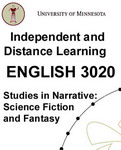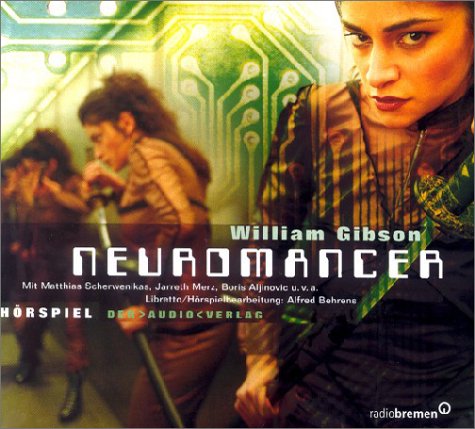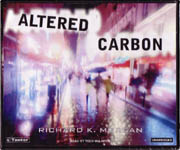
 Independent and Distance Learning – ENGLISH 3020 Studies In Narrative: Science Fiction & Fantasy
Independent and Distance Learning – ENGLISH 3020 Studies In Narrative: Science Fiction & Fantasy
Lectures by P.C. Hodgell and Michael Levy
20 MP3 Lectures
LINK: http://lrc.lib.umn.edu/Engl3020.htm
Approx 19 Hours [UNABRIDGED]
Publisher: University Of Minnesota
Published: 2002 (But recorded over several years)
Themes: / Non-Fiction / Science Fiction / Fantasy / Horror / Time Travel / Gothic Horror / Utopias / Dystopias / Religion / Vampires / Urban Fantasy / High Fantasy / Sword and Sorcery / Cyberpunk / Messiah / Apocalypse / Future War / Supermen / Robots / Feminism / Computers / Robots / Androids / Cyborgs / Dungeons & Dragons / Aliens /
Pat Hodgell and Mike Levy discuss the details of SF&F’s history in under 20 hours – no mean feat. Though in amongst the broad academic strokes there are many nice discussions listeners should note. These are academic university lectures, and not an entertainment talk show so the evidentiary schema is the primary focus.
The lectures are vaguely sequential to the history of science fiction and fantasy. The first lectures by Levy discusses the origins of Science Fiction, tackling the progenitive triumverate of Mary Wollstonecraft Shelley, H.G.Wells, and Jules Verne. The second lecture explores the early and mid twentieth century figures in the field: Edgar Rice Burroughs, Hugo Gernsback, John W. Campbell, Robert A. Heinlein. For the third and fourth lectures Fantasy author Pat Hodgell and the course’s instructor presents the origins of modern Fantasy from its roots in gothic novels and romanticism and then the various 19th century fantastic writings.
Levy’s turn on the fifth lecture covers the early Utopian and Dystopian stories with particular attention to the novels We, 1984 and Brave New World. His insightful commentary continues into the sixth lecture and covers post World War II SF with Astounding Vs. Galaxy Science Fiction Magazines, and the novels Frederik Pohl and C.M. Kornbluth’s The Space Merchants, Kurt Vonnegut’s Player Piano and John Brunner’s Shockwave Rider. For lectures seven and eight Hodgell investigates English Fantasy authors Charles Williams, C.S. Lewis and J.R.R. Tolkien. Handing off to Levy again for lectures nine and ten covering the general theme of Religion and the specific themes of Messiah and Apocalypse with the novel examples of James Blish’s A Case Of Conscience, Walter M. Miller Jr.’s A Canticle For Leibowitz, Arthur C. Clarke’s Childhood’s End and Robert A. Heinlein’s Stranger In A Strange Land.
Lecture eleven covers the theme of evolutionary Supermen – homo superior in his early fictional incarnations and where the strange motivation to write about them comes from. Lecture twelve is similar to eleven except its focus is on the manufactured heirs to humanity in the form of Computers, Robots, Androids and Cyborgs. This is also the first lecture to include a guest, SF author William F. Wu! Lectures thirteen and fourteen cover the ever popular Time Travel theme, including Connie Willis’ Firewatch, Mark Twain’s A Connecticut Yankee In King Arthur’s Court, Michael Moorcock’s Behold The Man and two of Heinlein’s excellent SF short stories All You Zombies and By His Bootstraps.
Lectures fifteen and sixteen investigate fantasy fiction after Tolkien’s influence covering the various themes of Horror, Vampires, Urban Fantasy, High Fantasy, Sword and Sorcery and the influence of the role playing game Dungeons & Dragons. Among the stories specifically discussed are Fritz Leiber’s Smoke Ghost, Richard Matheson’s I Am Legend, Ursula K. Le Guin’s “Earthsea” novels, Terry Pratchett’s “Discworld” novels and Robert E. Howard’s “Conan” stories. Lectures seventeen and eighteen examine women’s role in science fiction, with the themes of Utopias and Feminism, discussion of the novels Venus Plus X by Theodore Sturgeon and The Left Hand Of Darkness by Ursula K. Le Guin, as well as discussion of it’s authors, the likes of Joanna Russ, Ursula K. Le Guin, James Triptree Jr. and Octavia Butler.
Lecture nineteen breaks from the lecturing professor mold with Pat Hodgell doing an interview in the home of Minnesota SF author Gordon R. Dickson. He talks about how he writes, where he gets his ideas (from history dontcha know) and about the writing process – and this is a very valuable interview as Dickson is now deceased. Dickson novels discussed include among others Dorsai! and Soldier Ask Not. Pat Hodgell concludes the lecture series with a roundtable discussion with herself, Levy and SF author Elanor Arnason. Together they talk about Cyberpunk, William Gibson’s Neuromancer and the film Blade Runner, the use of Aliens in SF and some final thoughts about where they thing SF and F is going.
The sound quality of these lectures isn’t great. There are many background noises, people whispering, lecturers too close and too far from the mic, Gordon R. Dickson coughs a bit and various other aural annoyances are legion. But, it was recorded at a good level and I don’t think I missed one word that was above a whisper – these are lectures and they are free so don’t complain! The funny thing is after hearing these lectures I feel a very strange urge… to learn more about Minnesota. I’ve never had that urge before but Pat Hodgell and Mike Levy manage to include so many Minnesota references and connections into their lectures they sold me on the whole ‘10,000 Lakes to Explore’ deal! Hmmm, maybe these lectures are being given away for free because their underwritten by the Minnesota Tourism Bureau? In any case I heartily recommend you give one or some of these lectures a try they are good listening and good edjamacation.
Here’s a breakdown of the lectures::
Lecture 1 – 29 Minutes 6 Seconds – SF FOUNDATIONS
(LINK: http://lrc.lib.umn.edu/dai/P131_1A.MP3)
Lecture 2 – 27 Minutes 8 Seconds – SF FOUNDATIONS
(LINK: http://lrc.lib.umn.edu/dai/P131_1B.MP3)
Lecture 3 – 26 Minutes 46 Seconds – FANTASY
FOUNDATIONS
(LINK: http://lrc.lib.umn.edu/dai/P131_2A.MP3)
Lecture 4 – 27 Minutes 10 Seconds – FANTASY
FOUNDATIONS
(LINK: http://lrc.lib.umn.edu/dai/P131_2B.MP3)
Lecture 5 – 26 Minutes 7 Seconds – THE FUTURE
(LINK: http://lrc.lib.umn.edu/dai/P131_3A.MP3)
Lecture 6 – 26 Minutes 3 Seconds- THE FUTURE
(LINK: http://lrc.lib.umn.edu/dai/P131_3B.MP3)
Lecture 7 – 28 Minutes 2 Seconds- HOBBITS AND INKLINGS
(LINK: http://lrc.lib.umn.edu/dai/P131_4A.MP3)
Lecture 8 – 27 Minutes 9 Seconds- HOBBITS AND INKLINGS
(LINK: http://lrc.lib.umn.edu/dai/P131_4B.MP3)
Lecture 9 – 27 Minutes 18 Seconds- SCIENCE FICTION AND
RELIGION
(LINK: http://lrc.lib.umn.edu/dai/P131_5A.MP3)
Lecture 10 – 26 Minutes 57Seconds – SCIENCE FICTION
AND RELIGION
(LINK: http://lrc.lib.umn.edu/dai/P131_5B.MP3)
Lecture 11 – 27 Minutes 18 Seconds – SUPERMEN
(LINK: http://lrc.lib.umn.edu/dai/P131_6A.MP3)
Lecture 12 – 28 Minutes 11Seconds – ROBOTS, ANDROIDS
AND CYBORGS
(LINK: http://lrc.lib.umn.edu/dai/P131_6B.MP3)
Lecture 13 – 26 Minutes 7 Seconds- TIME TRAVEL
(LINK: http://lrc.lib.umn.edu/dai/P131_7A.MP3)
Lecture 14 – 27 Minutes 11 Seconds – TIME TRAVEL
(LINK: http://lrc.lib.umn.edu/dai/P131_7B.MP3)
Lecture 15 – 28 Minutes 2 Seconds – MODERN FANTASY AND
HORROR
(LINK: http://lrc.lib.umn.edu/dai/P131_8A.MP3)
Lecture 16 – 43 Minutes 47 Seconds – MODERN FANTASY
AFTER TOLKIEN
(LINK: http://lrc.lib.umn.edu/dai/P131_8B.MP3)
Lecture 17 – 27 Minutes 30 Seconds -WOMEN IN SCIENCE
FICTION
(LINK: http://lrc.lib.umn.edu/dai/P131_9A.MP3)
Lecture 18 – 27 Minutes 57 Seconds -WOMEN IN SCIENCE
FICTION
(LINK: http://lrc.lib.umn.edu/dai/P131_9B.MP3)
Lecture 19 – 44 Minutes 16 Seconds – AN INTERVIEW WITH
GORDON R. DICKSON
(LINK: http://lrc.lib.umn.edu/dai/P131_10A.MP3)
Lecture 20 – 43 Minutes 46 Seconds – CYBERPUNK AND
ALIENS
(LINK: http://lrc.lib.umn.edu/dai/P131_10B.MP3)
Posted by Jesse Willis







